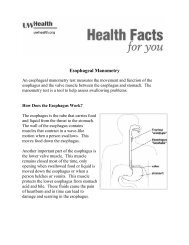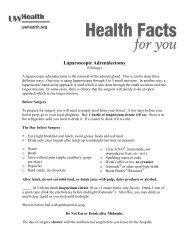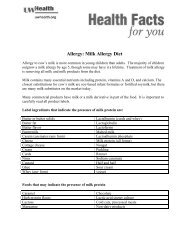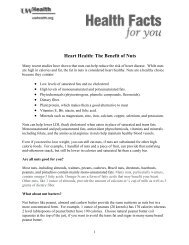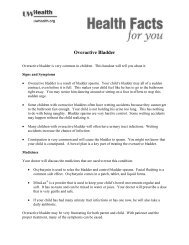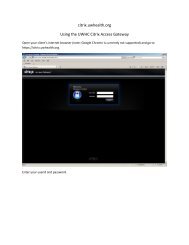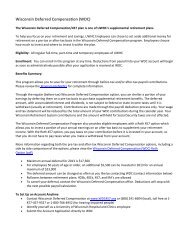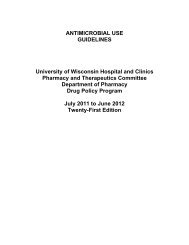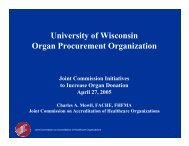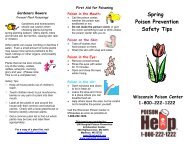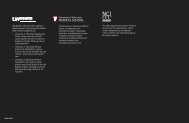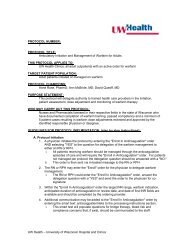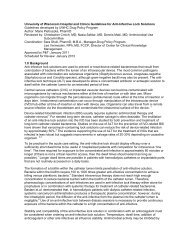Heart Healthy Living for Women - UW Health
Heart Healthy Living for Women - UW Health
Heart Healthy Living for Women - UW Health
You also want an ePaper? Increase the reach of your titles
YUMPU automatically turns print PDFs into web optimized ePapers that Google loves.
AnleitungSavannah Gordigear
Causes of high blood pressureo ageo family historyo race (African Americans)o obesityo stresso dieto inactivityo diabeteso kidney diseaseYou could have high blood pressure, have no symptoms and feel fine. Long be<strong>for</strong>e high bloodpressure is noticed it can damage vital organs in your body. High blood pressure may lead toserious health problems. Having high blood pressure and atherosclerosis increases your risk <strong>for</strong>heart disease and stroke.Weight – being overweight increases your risk of heart disease and stroke. It can increase bloodpressure, cholesterol, and triglyceride levels. Excess weight can also increase your risk <strong>for</strong>diabetes. Losing as little as 10-20 pounds, can help to decrease your risk <strong>for</strong> heart disease orother chronic diseases. Ask your doctor to help you set a good eating and exercise plan. It maybe helpful to meet with a nutritionist and an exercise physiologist. Talk to your doctor abouthow to lose excess weight. Your body mass index (BMI) is one of the best ways to know if youare overweight. Your waist size can also be used. You are overweight if your BMI is between25.0-29.9. You are obese if your BMI is greater than 30.0.Body Mass Index (BMI)MaleFemale21 – 25 Normal risk 21 – 25 Normal riskgreater than 25 Increased riskgreater than 25 Increased risk<strong>for</strong> disease<strong>for</strong> diseaseWaist Measurement:This is also used to determine risk.Malegreater than 40 inches increased risk<strong>for</strong> heart disease and diabetesFemalegreater than 35 inches increased risk<strong>for</strong> heart disease and diabetes (<strong>for</strong>Asian Americans greater than 31inches there is increased risk.)5
Exercise – being inactive doubles your risk <strong>for</strong> heart disease. Some of the benefits of aerobicexercise (walking, running, biking, and swimming) are listed below.• Lowers blood pressure• Lowers blood sugar• Lowers stress level• Lowers cholesterol levels• Weight controlAerobic exercise should be done on a regular basis.Aerobic exercise involves continuous movement ofthe major muscle groups that increases your heartrate and breathing rate. If you exercise <strong>for</strong> 30minutes a day at a moderate intensity you only needto do this 5 times per week. This can even be helpfulif done in three, 10-minute sessions. If you can talkcom<strong>for</strong>tably and exercise at the same time withoutgasping between words, you are not working toohard. If you can sing and maintain your level ofef<strong>for</strong>t you are likely not working hard enough. Ifyou get out of breath quickly, you are likely workingtoo hard. You can also use the Perceived Exertionscale to regulate the exercise intensity. Exerciseshould feel fairly light to somewhat hard or an 11-13on the scale.Exertion Rating9 Very light (easy)1011 Fairly light1213 Somewhat hard1415 HardStressful lifestyle – stress that is not managed can also put you at increased risk <strong>for</strong> heartdisease. Stress can show itself in many <strong>for</strong>ms such as tense muscles, tension headaches, eatingtoo much, irritability, upset stomach, increased blood pressure and heart rate. Exercise,meditation, and other relaxation techniques can help to reduce stress.Eat a well-balanced and varied diet. A heart healthy diet is low in fat and cholesterol. It isalso high in fiber found in grains, fresh fruits, and vegetables. Products that contain soy such assoy nuts, soymilk, and tofu, may help to prevent atherosclerosis.• Control salt intake. Eat foods high in potassium.• Vitamin supplements. Ask your doctor if you should take a multivitamin• Notify your health care provider if you have any signs of heart disease• Identify and control diabetesWeb Sites• American <strong>Heart</strong> Association – www.amhrt.org• American Association Family Practice – www.aafp.org• American College Cardiology – www.acc.org• <strong>UW</strong> Department of Medicine – Cardiology – www.uwhospital.org/Copyright © 2/2011 University of Wisconsin Hospitals & Clinics Authority, Madison, WI, All Rights Reserved.Produced by the Department of Nursing. <strong>UW</strong>H #54196



